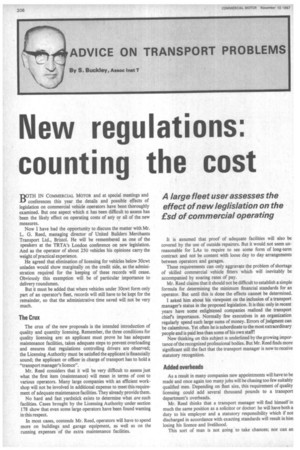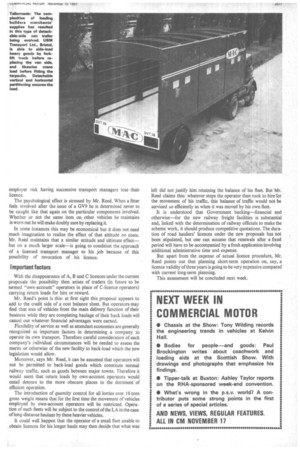New regulations: counting the cost
Page 208

Page 209

If you've noticed an error in this article please click here to report it so we can fix it.
DOTE IN COMMERCIAL MOTOR and at special meetings and conferences this year the details and possible effects of legislation on commercial vehicle operators have been thoroughly examined. But one aspect which it has been difficult to assess has been the likely effect on operating costs of any or all of the new measures.
Now I have had the opportunity to discuss the matter with Mr. L. G. Reed, managing director of United Builders Merchants Transport Ltd., Bristol. He will be remembered as one of the speakers at the TRTA's London conference on new legislation. And as the operator of about 250 vehicles his opinions carry the weight of practical experience.
He agreed that elimination of licensing for vehicles below 30cwt unladen would show marginally on the credit side, as the administration required for the keeping of these records will cease. Obviously this exemption will be of particular importance to delivery round smelt But it must be added that where vehicles under 30cwt form only part of an operator's fleet, records will still have to be kept for the remainder, so that the administrative time saved will not be very much.
The Crux
The crux of the new proposals is the intended introduction of quality and quantity licensing. Remember, the three conditions for quality licensing are: an applicant must prove he has adequate maintenance facilities, takes adequate steps to prevent overloading and ensures that regulations controlling drivers are observed; the Licensing Authority must be satisfied the applicant is financially sound; the applicant or officer in charge of transport has to hold a "transport manager's licence".
Mr. Reed considers that it will be very difficult to assess just what the first item (maintenance) will mean in terms of cost to various operators. Many large companies with an efficient workshop will not be involved in additional expense to meet this requirement of adequate maintenance facilities. They already provide them.
No hard and fast yardstick exists to determine what are such facilities. Cases brought by the Licensing Authority under section 178 show that even some large operators have been found wanting in this respect.
In most cases, contends Mr. Reed, operators will have to spend more on buildings and garage equipment, as well as on the running expenses of the extra maintenance facilities. It is assumed that proof of adequate facilities will also be covered by the use of outside repairers. But it would not seem unreasonable for LAs to require to see some form of long-term contract and not be content with loose day to day arrangements between operators and garages.
These requirements can only aggravate the problem of shortage of skilled commercial vehicle fitters which will inevitably be accompanied by soaring rates of pay.
Mr. Reed claims that it should not be difficult to establish a simple formula for determining the minimum financial standards for an operator. But until this is done the effects cannot be determined.
I asked him about his viewpoint on the inclusion of a transport manager's status in the proposed legislation. It is this: only in recent years have some enlightened companies realized the transport chief's importance. Normally few executives in an organization regularly spend such large sums of money. Errors of judgment can be calamitous. Yet often he is subordinate to the most extraordinary people and is paid less than some of his own staff!
New thinking on this subject is underlined by the growing importance of the recognized professional bodies. But Mr. Reed finds more significant still the fact that the transport manager is now to receive statutory recognition.
Added overheads
As a result in many companies new appointments will have to be made and once again too many jobs will be chasing too few suitably qualified men. Depending on fleet size, this requirement of quality licensing could add several thousand pounds to a transport department's overheads.
Mr. Reed thinks that a transport manager will find himself in much the same position as a solicitor or doctor: he will have both a duty to his employer and a statutory responsibility which if not discharged in accordance with exacting standards will result in him losing his licence and livelihood.
This sort of man is not going to take chances; nor can an employer risk having successive transport managers lose their licence.
The psychological effect is stressed by Mr. Reed. When a fitter feels involved after the issue of a GV9 he is determined never to be caught like that again on the particular components involved. Whether or not the same item on other vehicles he maintains is worn out he will make doubly sure by replacing it.
In some instances this may be economical but it does not need much imagination to realize the effect of that attitude on costs. Mr. Reed maintains that a similar attitude and ultimate effect— but on a much larger scale—is going to condition the approach of a licensed transport manager to his job because of this possibility of revocation of his licence.
Important factors
With the disappearance of A, B and C licences under the current proposals the possibility then arises of traders (in future to be termed "own-account" operators in place of C-licence operators) carrying return loads for hire or reward.
Mr. Reed's point is this: at first sight this proposal appears to add to the credit side of a cost balance sheet. But operators may find that loss of vehicles from the main delivery function of their business while they are completing haulage of their back loads will cancel out whatever financial advantages were earned.
Flexibility of service as well as attendant economies are generally recognized as important factors in determining a company to operate its own transport. Therefore careful consideration of each company's individual circumstances will be needed to assess the merits or otherwise of the new facility to back-load which the new legislation would allow.
Moreover, says Mr. Reed, it can be assumed that operators will not be permitted to back-load goods which constitute normal railway traffic, such as goods between major towns. Therefore it would seem that return loads by own-account operators would entail detours to the more obscure places to the detriment of efficient operation.
The introduction of quantiO) control for all lorries over 16 tons gross weight means that fix the first time the movement of vehicles employed by own-account operators will be restricted. Operation of such fleets will be subject to the control of the LA in the case of long-distance haulage by these heavier vehicles.
It could well happen that the operator of a small fleet unable to obtain licences for his longer hauls may then decide that what was left did not justify him retaining the balance of his fleet. But Mr. Reed claims this: whatever steps the operator then took to hire for the movement of his traffic, this balance of traffic would not be serviced so efficiently as when it was moved by his own fleet.
It is understood that Government backing—financial and otherwise—for the new railway freight facilities is substantial and, linked with the determination of railway officials to make the scheme work, it should produce competitive quotations. The duration of road hauliers' licences under the new proposals has not been stipulated, but one can assume that renewals after a fixed period will have to be accompanied by a fresh application involving additional administrative time and expense.
But apart from the expense of actual licence procedure, Mr. Reed points out that planning short-term operation on, say, a licence validity of three years is going to be very expensive compared with current long-term planning.
This assessment will be concluded next week.




































































































































































































































































